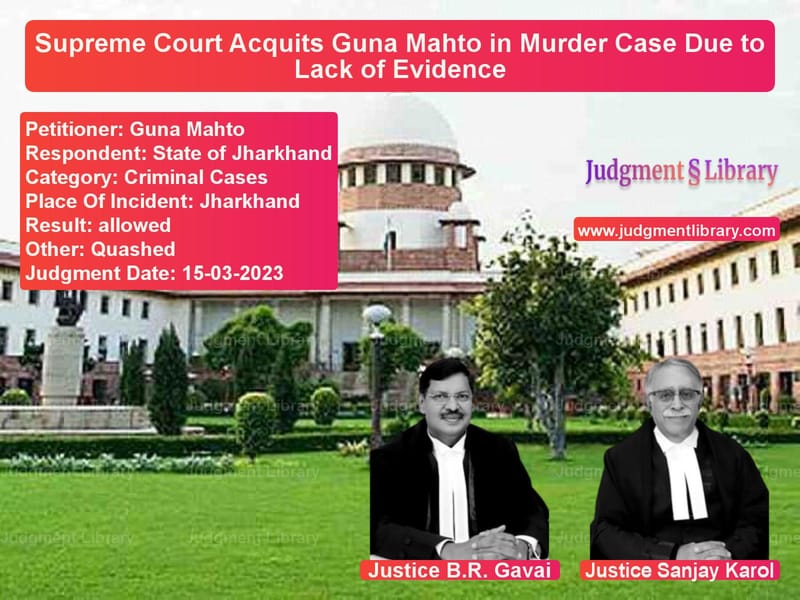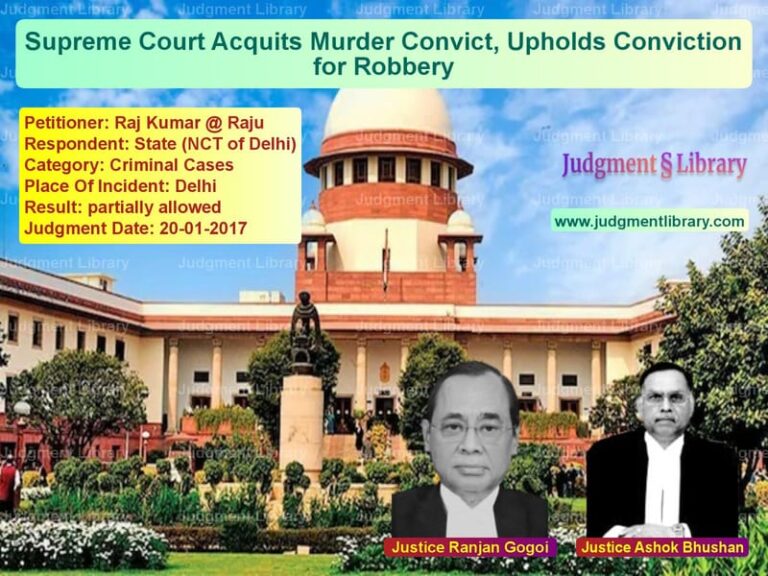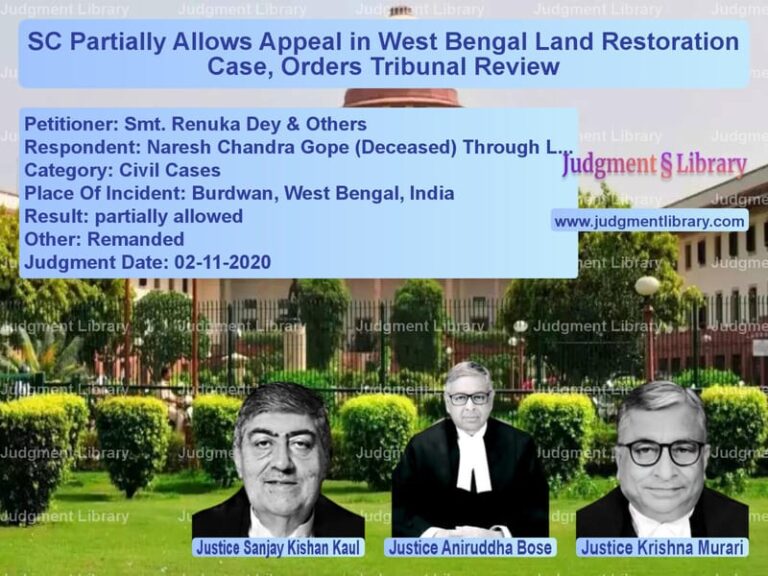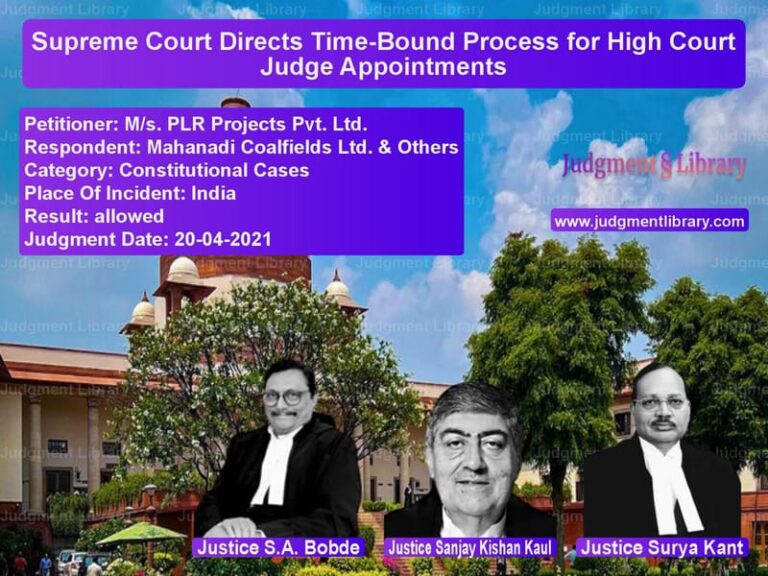Supreme Court Acquits Guna Mahto in Murder Case Due to Lack of Evidence
The Supreme Court of India recently delivered a significant judgment in Guna Mahto v. State of Jharkhand, setting aside his conviction in a murder case due to a lack of evidence and procedural lapses. The ruling highlights the importance of proving guilt beyond a reasonable doubt in criminal cases and ensuring that justice is not compromised due to inadequate investigations.
Background of the Case
The case arose from the conviction of Guna Mahto for the murder of his wife, Deomatiya Devi. The Trial Court convicted him under Section 302 of the Indian Penal Code (IPC) for murder and Section 201 IPC for causing the disappearance of evidence. He was sentenced to life imprisonment and an additional two years of rigorous imprisonment. The Jharkhand High Court upheld this conviction, despite acknowledging that the investigating officer was not examined during the trial.
Guna Mahto challenged the High Court’s ruling in the Supreme Court, arguing that the evidence against him was weak and that his conviction was based solely on circumstantial evidence.
Legal Issues Considered
- Whether the circumstantial evidence presented against the accused was sufficient to establish guilt beyond a reasonable doubt.
- Whether the non-examination of the investigating officer undermined the prosecution’s case.
- Whether the absence of direct evidence linking the accused to the crime could sustain a conviction.
- Whether the High Court erred in affirming the conviction despite procedural lapses.
Arguments of the Parties
Petitioner’s Arguments (Guna Mahto)
- The entire case was based on circumstantial evidence, which did not conclusively establish his guilt.
- The prosecution failed to examine the investigating officer, leading to serious gaps in the evidence.
- There were inconsistencies in the testimonies of key prosecution witnesses.
- No direct evidence linked him to the crime, and the prosecution’s theory was based on mere suspicion.
Respondent’s Arguments (State of Jharkhand)
- The circumstantial evidence was strong enough to convict the accused.
- The deceased was last seen with the accused, which indicated his involvement in the crime.
- The accused lodged a false missing person report, which pointed to his guilty conscience.
- The lower courts had already examined the evidence and reached a fair conclusion.
Key Observations of the Supreme Court
The Supreme Court, after reviewing the evidence, made several key observations:
- Non-examination of the Investigating Officer: The Court noted that the prosecution’s failure to present the investigating officer severely weakened the case. It held that in cases relying on circumstantial evidence, thorough investigation and credible testimony are crucial.
- Lack of Direct Evidence: The Court emphasized that there was no direct evidence linking the accused to the crime. The case was based on speculation and conjecture rather than concrete proof.
- Contradictory Testimonies: The statements of prosecution witnesses were found to be inconsistent, raising doubts about their reliability.
- Principles of Circumstantial Evidence: The Court referred to the landmark case of Sharad Birdhichand Sarda v. State of Maharashtra (1984), reiterating that circumstantial evidence must form a complete chain pointing only to the guilt of the accused and ruling out all other possibilities.
Key Judgment Excerpts
The Supreme Court observed:
“The prosecution must prove the guilt of the accused beyond a reasonable doubt, and the circumstances relied upon must point only towards one hypothesis, that is, the guilt of the accused alone and none else.”
The Court further held:
“Suspicion, however grave it may be, cannot take the place of proof. The failure to examine the investigating officer and the absence of direct evidence cast a serious shadow over the prosecution’s case.”
Final Judgment
Based on the findings, the Supreme Court:
- Set aside the conviction and sentence imposed on the appellant.
- Directed that the appellant be acquitted of all charges.
- Ordered that the bail bond of the appellant be discharged.
Accordingly, the Supreme Court allowed the appeal and acquitted Guna Mahto.
Implications of the Judgment
The ruling has significant implications for criminal jurisprudence:
- Ensures Fair Trial: The judgment underscores the importance of a fair trial and the need for credible evidence in securing convictions.
- Reinforces Due Process: The ruling highlights that failure to follow due process, such as non-examination of key witnesses, can lead to wrongful convictions.
- Strengthens the Principle of ‘Beyond Reasonable Doubt’: The judgment reaffirms that criminal convictions cannot be based on mere suspicion or weak circumstantial evidence.
- Promotes Accountability in Investigations: The Court’s ruling serves as a reminder to law enforcement agencies to conduct thorough and transparent investigations.
Conclusion
The Supreme Court’s decision in Guna Mahto v. State of Jharkhand is a landmark ruling that upholds the fundamental principles of criminal justice. By acquitting the appellant due to a lack of conclusive evidence, the Court has reinforced the necessity of proving guilt beyond a reasonable doubt. This judgment will serve as an important precedent in ensuring that convictions are based on solid and credible evidence rather than speculation.
Petitioner Name: Guna Mahto.Respondent Name: State of Jharkhand.Judgment By: Justice B.R. Gavai, Justice Sanjay Karol.Place Of Incident: Jharkhand.Judgment Date: 15-03-2023.
Don’t miss out on the full details! Download the complete judgment in PDF format below and gain valuable insights instantly!
Download Judgment: guna-mahto-vs-state-of-jharkhand-supreme-court-of-india-judgment-dated-15-03-2023.pdf
Directly Download Judgment: Directly download this Judgment
See all petitions in Bail and Anticipatory Bail
See all petitions in Custodial Deaths and Police Misconduct
See all petitions in Judgment by B R Gavai
See all petitions in Judgment by Sanjay Karol
See all petitions in allowed
See all petitions in Quashed
See all petitions in supreme court of India judgments March 2023
See all petitions in 2023 judgments
See all posts in Criminal Cases Category
See all allowed petitions in Criminal Cases Category
See all Dismissed petitions in Criminal Cases Category
See all partially allowed petitions in Criminal Cases Category







